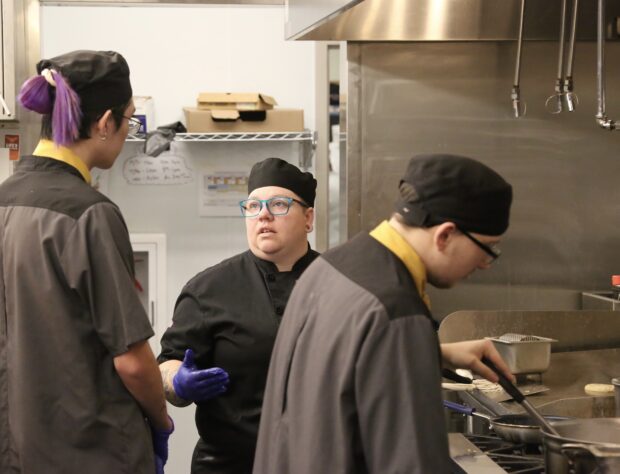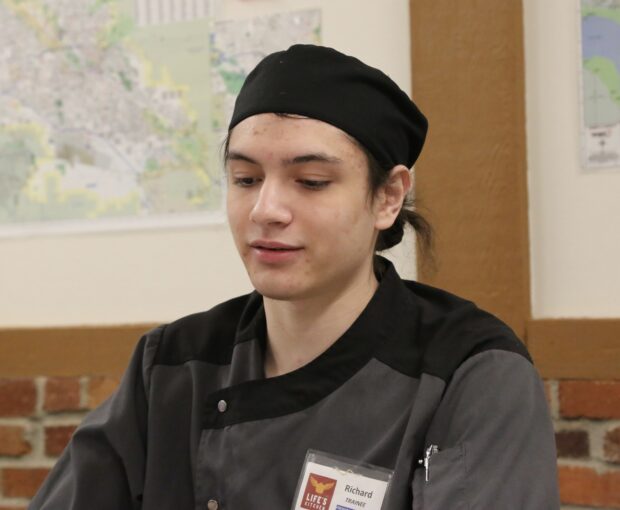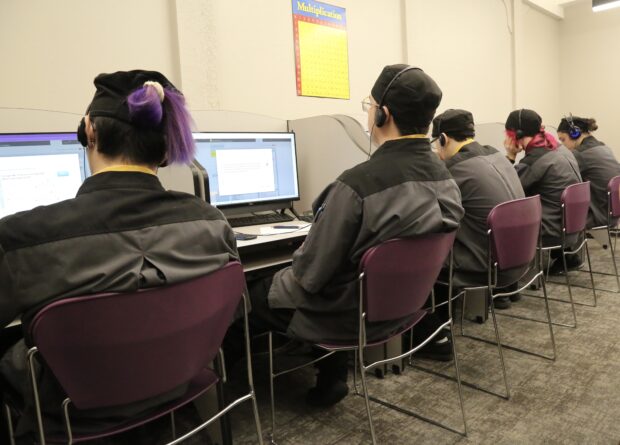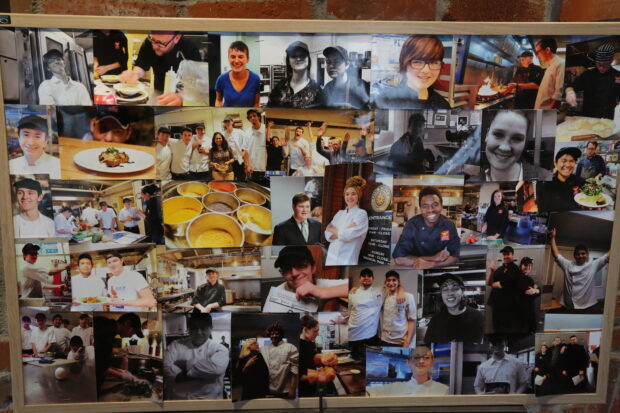
Scrambling eggs and chopping onions is the beginning of great things for most of the at-risk students in this program.
For the past 20 years, the staff at Life’s Kitchen in Boise has quietly helped vulnerable teenagers navigate difficult social and economic obstacles while finishing high school.
Many of these young teenagers are dropouts because they struggled to fit in at a traditional high school or they failed classes.
Support organizations like Life’s Kitchen are seeing more young people enter the program because of mental illness, said Tammy Johnson, the program’s executive director. Since the pandemic year of 2020, the number of Idaho dropouts increased by 32% in 2021, from 1,235 to 1,631; in 2022 there was a slight dip of 6%, from 1,631 back to 1,533 — but still 24% higher than 2020.
Life’s Kitchen also encounters young people in crises: homelessness, poverty, domestic violence, incarceration and substance abuse.
Child and Family Services, the juvenile justice system and mental health providers regularly refer teenagers in desperate situations who need to develop workplace skills and finish high school or get their GED.
Richard Bliss, 17, joined Life’s Kitchen in February. Having never attended school, he’s lived a nomadic lifestyle with his free-spirited parents. His travels have taken him to nearly every U.S state, but he had no idea how to do algebra.

That’s when the kitchen helps these at-risk youth take control.
“I just think Life’s Kitchen is such a big resource for the kids in our community who would otherwise have nothing,” said Beth Frasier, an independent living coordinator with Child and Family Services.
A meaningful change happens. The staff of 13 and their 40 volunteers instill confidence by helping student trainees finish what they start.
“It’s just great when kids complete it, because there’s a big sense of accomplishment, and they obtain a skill set that is irreplaceable,” said Frasier.
That journey begins with a 16-week holistic education program that includes food service and life skills training. They’re taught about financial literacy, buying insurance, renting an apartment, finding a job, doing taxes and college enrollment; in the kitchen, they learn safe food handling, knife cutting techniques, barista training, and basic culinary theory.
Each trainee costs the program about $11,700 because of the cost of uniforms, meals, bus passes, and education services.
The nonprofit covers a little more than half of those costs through its catering and restaurant businesses; the rest comes from foundation, corporate and individual donations.
About 60% of the young people who train there are between the ages of 16 to 18; the remaining 40% are 19 to 20 years old. Since 2003, Life’s Kitchen has provided over 550,000 hours of job training to more than 755 young adults, according to the organization’s website.

“I really love Life’s Kitchen. They have all the resources for the education piece. They pay for the GED and hook them up with the department of labor, internships, and build the skill sets necessary to be independently successful,” Frasier said.
Student trainees learn about customer service, work in food preparation, handle “back of the house” tasks like cleaning and dishwashing, and learn cooking skills.
Unlike traditional schools, Life’s Kitchen strictly forbids the use of cell phones during work and academic hours — from 8 a.m. to 4 p.m.
Removing that distraction helps them concentrate and focus, said Sue Olszewski, the organization’s program director.
“The reality is that the students that come here have gifts that have not been realized. And it’s our job to uncover those gifts and talents, and help them understand how they can be successful using those talents,” Olszewski said.
When high school and alternative school counselors refer at-risk students to the program, Life’s Kitchen provides them with a unique, four-phase experience.
- First four weeks: orientation and introduction to the core competencies for successful employment.
- Second four weeks: practical cooking experience and weekly life skills classes about leadership, confidence, and self-sufficiency.
- Third four weeks: gain experience working in the café and producing school and community charitable meals.
- Final four weeks: participate in internships or job shadows at local restaurants or food service facilities.
- Graduation: after 640 hours of training, tests and classes are completed, students attend graduation.
That formula is working. Olszewski said 90% of her graduates earn their GED or diploma. A cohort of about six or seven students complete the course every four months.
West Ada School District college and career counselor Nichole Deakins typically refers on average four to five students each year from Eagle, Meridian, and Central academy high schools.
“Life’s Kitchen is a great option for students to receive the support to complete their GED,” Deakins said.
“I have had many students be successful at Life’s Kitchen and go on into the workforce and even attend college after their program. It gives students another chance and a new hope that they can still reach their goals with a different pathway that works best for them,” she added.
The last class to graduate from the kitchen did so in January. Two earned one-year internships with Shore Lodge resort in McCall; two are registered to attend college in the fall; one is working in food service and considering joining the Coast Guard; and the sixth is back in the program part-time to complete GED requirements.
“They’re all talented, and they’re all amazing kids,” Olszewski said.
Bliss, who was born in California, now lives with his grandparents in the Treasure Valley. And with the help of GED tutors, he is making positive academic progress. The College of Western Idaho provides a part-time tutor and Boise State University has two college interns working on-site for a year.
To learn more about the program, which was founded by Rory Farrow, visit the kitchen’s website. The restaurant is located at 8574 West Fairview Avenue in Boise, and it is open five days a week for breakfast and lunch.
Repeat customers is commonplace, because Olszewski likes to remind their customers that the meal they just ate helped pay for another student’s GED.

